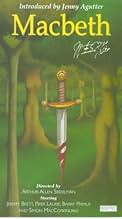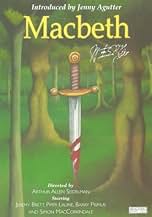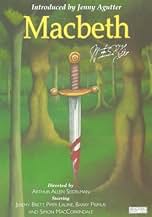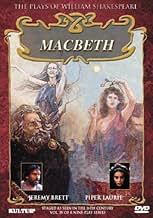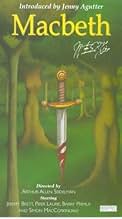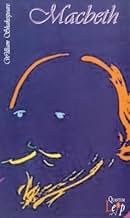Ajouter une intrigue dans votre langueMacbeth, the Thane of Glamis, receives a prophecy from a trio of witches that one day he will become King of Scotland. Consumed by ambition and spurred to action by his wife, Macbeth murders... Tout lireMacbeth, the Thane of Glamis, receives a prophecy from a trio of witches that one day he will become King of Scotland. Consumed by ambition and spurred to action by his wife, Macbeth murders his king and takes the throne for himself.Macbeth, the Thane of Glamis, receives a prophecy from a trio of witches that one day he will become King of Scotland. Consumed by ambition and spurred to action by his wife, Macbeth murders his king and takes the throne for himself.
- Réalisation
- Scénario
- Casting principal
Brad David
- Ross
- (as Brad David Stockton)
Phillip Persons
- Menteith
- (as Philip Persons)
Avis à la une
Not only is this the worst interpretation ( OR LACK THEREOF ) of Shakespeare's classic , it also includes one of the worst performances by a great actor ever witnessed. The brilliant Jeremy Brett is so over the top its laughable. not since peter o'toole's henry higgin's has there been such a loud bellowing performance so devoid of human emotion. Piper Laurie is also awful as his Lady. it seems the production was put up in a matter of days for a "take the money and run.' pay check. UNINSPIRED WITH NO VISION IS THE BOTTOM LINE.
I agree that it is one of the worst versions of Macbeth ever made. Perhaps the worst. Brett overacts and Laurie is just ludicrous. The one good feature is the choreography for the three Witches. I had to preview this for inclusion in a college curriculum. All of us in the small audience (admittedly of English teachers) were laughing hysterically by the middle of the film. I am a strong admirer of Jeremy Brett, though even as Sherlock Holmes, he sometimes was over the top. His performance here is embarrassing. The Trevor Nunn video with Dench and McKellan is by far the best Macbeth ever put on film. I first saw it in the 1980's and have never forgotten it. Now if only some producer would pay to have Patrick Stewart's recent Chichester Macbeth on DVD, we would have two great productions to enjoy.
It sounded so promising. Jeremy Brett in the title role, with Piper Laurie as Lady M and Simon MacCorkindale as Macduff. So far, so good.
That's where it stops. They are all dreadful. Very sad to say it, but who on earth allowed this mistake out into the wide world? I'm curious since there's ample evidence that Brett and Laurie at least are capable of performances of more depth and less posturing and declaiming than this. Was it then their director's fault? It's tempting to think so. MacCorkindale - well, he's adequate I suppose but by the time Macduff gets going it is far too late for this production.
I'm afraid I watched it once and it has been stuck on my video shelf covered with dust ever since. Maybe I'll give it another go someday. But not until the memory of being bored stiff by it recedes.
That's where it stops. They are all dreadful. Very sad to say it, but who on earth allowed this mistake out into the wide world? I'm curious since there's ample evidence that Brett and Laurie at least are capable of performances of more depth and less posturing and declaiming than this. Was it then their director's fault? It's tempting to think so. MacCorkindale - well, he's adequate I suppose but by the time Macduff gets going it is far too late for this production.
I'm afraid I watched it once and it has been stuck on my video shelf covered with dust ever since. Maybe I'll give it another go someday. But not until the memory of being bored stiff by it recedes.
Many have been the stagings and film adaptations of the Scottish play, and many have been those that earned their esteem. Though it's no less true of any play, I dare say it's especially true of Bill Shakes generally, and 'Macbeth' specifically, that pursuing one's own vision has its advantages and its disadvantages. On the one hand the story, scenes, dialogue, and characters are already laid before you, and one need only make slight modifications as per one's concept; unless one is also bringing the Lord and Lady into an entirely new setting, then the groundwork is already established for the art direction, costume design, and hair and makeup, too. On the other hand, as audiences are so familiar with the source material, we are surely more prone to discerning weaknesses or shortcomings; many of the strengths are already assured, and barring some major spark of ingenuity, it's not the strengths that will most catch our attention.
So what of this 1981 rendition, directed by Arthur Allan Seidelman? It's noteworthy that the verses are far more complete here compared to elsewhere; it's not that any other iteration is bereft, but especially when it comes to 'Macbeth' on film (and even some theatrical stagings), some non-critical lines are excised to help streamline the telling. In this instance, those non-critical lines are left intact, and it surely does feel in at least some small measure that this is more complete and faithful for the fact of their inclusion. The set is relatively simple and straightforward, but practical and nevertheless fetching; the costume design, hair and makeup may be less detailed than what we've seen elsewhere, but are appreciable all the same. The pacing is just right, the weird sisters are appropriately eerie and otherworldly, and I've no notes on the fundamental stage direction in terms of the placement and movement of those within each scene, including the choreography of fights. All the basic pieces are here, and if it's an unadulterated version of 'Macbeth' that you want, it's what you'll get, as if we were reading along yet hearing the words spoken aloud.
But I find myself troubled, for there is one crucial component at issue. I assume the responsibility may fall upon the shoulders of director Seidelman, but it may also reasonably said that the players share some blame, for it is in the performances that this treatment stumbles, and stumbles somewhat considerably. William Shakespeare's 'Macbeth' is famous as a spectacle of violence, madness, blood, and death, and aside from the language, if there is only one consistency across all the best adaptations thereof, it's the strong emotions and high passions that course through the narrative and each scene in turn. This applies to all roles, but of course above all to Lord and Lady Macbeth, whose realizations should be marked by buzzing electricity if not also great fire. Here, however, it is these qualities that are most notably lacking for too much of the length. At least half the runtime of this version is commonly characterized by hollow, tepid recitation of lines, and absent from such recitation are definitely the complicated emotions that the characters should bear, and too often also the distinct passions that should fuel the proceedings. That absence is felt all the more for the fact of its presence to come - and yet it's not until the banquet of Act III that this 'Macbeth' truly comes together as the delirium, paranoia, derangement, and subsequent aberrant behavior truly begins to manifest, and the violence is more discretely visualized.
Perhaps this was the focal point all along of Seidelman's vision, that all should bend their energies toward the most gnarly facets of the Scottish play. In fairness to the director, to stars Jeremy Brett and Piper Laurie, and to all other cast members, the latter half of the rendition here emphatically demonstrates more power, the vitality we had wished to be present all along. The nightmarish visions are more disturbing, the murders carry more weight, and even the customarily quieter moments are rife with vibrancy and excitement as the complex feelings and zeal of the tale boil over. That's not to say that the back end is flawless in this capacity, but it is definitely to say that the disparity between Acts I and II, and Acts III, IV, and V, is glaring. For that disparity, and the relative dullness of the former, the whole is diminished, to say nothing of how the rudimentary delivery and body language of some players (Laurie not least, sadly) raise a skeptical eyebrow at no few points throughout; some major sequences, such as Macbeth's "tomorrow and tomorrow and tomorrow" soliloquy of Act V Scene v, are just rather unconvincing. The latter half may be welcome and compelling, but nonetheless the sum total comes across as 50-70% of the viewing experience it ideally should have been.
Maybe I'm being too harsh; maybe I'm being too generous. I'm inclined in this instance to still bestow more favor upon the feature than not, thanks to the value we see as the length stretches on. Other aspects are certainly well done, too, including the lighting and editing, and the music that comes to the fore more in the latter half. I can't help but be a bit disappointed, though; there have been some truly great renditions of 'Macbeth' (my top favorites to date are Rupert Goold's 2010 conception with Patrick Stewart and Kate Fleetwood, and Joel Coen's 2021 movie with Denzel Washington and Frances McDormand); for the faults this boasts, it's notably lesser in my estimation. I still like it much more than not, but unless you're an especial fan of someone involved or keen on full word-for-word fidelity in translating Shakespeare's verses, there are other kindred titles that should take higher priority on one's list. Do watch this 1981 rendition of 'Macbeth,' but watch it only after you've tended to others that are more plainly deserving.
So what of this 1981 rendition, directed by Arthur Allan Seidelman? It's noteworthy that the verses are far more complete here compared to elsewhere; it's not that any other iteration is bereft, but especially when it comes to 'Macbeth' on film (and even some theatrical stagings), some non-critical lines are excised to help streamline the telling. In this instance, those non-critical lines are left intact, and it surely does feel in at least some small measure that this is more complete and faithful for the fact of their inclusion. The set is relatively simple and straightforward, but practical and nevertheless fetching; the costume design, hair and makeup may be less detailed than what we've seen elsewhere, but are appreciable all the same. The pacing is just right, the weird sisters are appropriately eerie and otherworldly, and I've no notes on the fundamental stage direction in terms of the placement and movement of those within each scene, including the choreography of fights. All the basic pieces are here, and if it's an unadulterated version of 'Macbeth' that you want, it's what you'll get, as if we were reading along yet hearing the words spoken aloud.
But I find myself troubled, for there is one crucial component at issue. I assume the responsibility may fall upon the shoulders of director Seidelman, but it may also reasonably said that the players share some blame, for it is in the performances that this treatment stumbles, and stumbles somewhat considerably. William Shakespeare's 'Macbeth' is famous as a spectacle of violence, madness, blood, and death, and aside from the language, if there is only one consistency across all the best adaptations thereof, it's the strong emotions and high passions that course through the narrative and each scene in turn. This applies to all roles, but of course above all to Lord and Lady Macbeth, whose realizations should be marked by buzzing electricity if not also great fire. Here, however, it is these qualities that are most notably lacking for too much of the length. At least half the runtime of this version is commonly characterized by hollow, tepid recitation of lines, and absent from such recitation are definitely the complicated emotions that the characters should bear, and too often also the distinct passions that should fuel the proceedings. That absence is felt all the more for the fact of its presence to come - and yet it's not until the banquet of Act III that this 'Macbeth' truly comes together as the delirium, paranoia, derangement, and subsequent aberrant behavior truly begins to manifest, and the violence is more discretely visualized.
Perhaps this was the focal point all along of Seidelman's vision, that all should bend their energies toward the most gnarly facets of the Scottish play. In fairness to the director, to stars Jeremy Brett and Piper Laurie, and to all other cast members, the latter half of the rendition here emphatically demonstrates more power, the vitality we had wished to be present all along. The nightmarish visions are more disturbing, the murders carry more weight, and even the customarily quieter moments are rife with vibrancy and excitement as the complex feelings and zeal of the tale boil over. That's not to say that the back end is flawless in this capacity, but it is definitely to say that the disparity between Acts I and II, and Acts III, IV, and V, is glaring. For that disparity, and the relative dullness of the former, the whole is diminished, to say nothing of how the rudimentary delivery and body language of some players (Laurie not least, sadly) raise a skeptical eyebrow at no few points throughout; some major sequences, such as Macbeth's "tomorrow and tomorrow and tomorrow" soliloquy of Act V Scene v, are just rather unconvincing. The latter half may be welcome and compelling, but nonetheless the sum total comes across as 50-70% of the viewing experience it ideally should have been.
Maybe I'm being too harsh; maybe I'm being too generous. I'm inclined in this instance to still bestow more favor upon the feature than not, thanks to the value we see as the length stretches on. Other aspects are certainly well done, too, including the lighting and editing, and the music that comes to the fore more in the latter half. I can't help but be a bit disappointed, though; there have been some truly great renditions of 'Macbeth' (my top favorites to date are Rupert Goold's 2010 conception with Patrick Stewart and Kate Fleetwood, and Joel Coen's 2021 movie with Denzel Washington and Frances McDormand); for the faults this boasts, it's notably lesser in my estimation. I still like it much more than not, but unless you're an especial fan of someone involved or keen on full word-for-word fidelity in translating Shakespeare's verses, there are other kindred titles that should take higher priority on one's list. Do watch this 1981 rendition of 'Macbeth,' but watch it only after you've tended to others that are more plainly deserving.
Jeremy Bret gives a great, eccentric performance in this performance of Shakespere's classic play. The locations are all on stage, so the sets are not fancy. Still, the acting more than makes up for it and the action scenes are well done as well. Any fan of the play cannot go wrong with this performance.
Le saviez-vous
- AnecdotesMaria Mayenzet's debut.
- ConnexionsVersion of Macbeth (1898)
Meilleurs choix
Connectez-vous pour évaluer et suivre la liste de favoris afin de recevoir des recommandations personnalisées
Détails
Contribuer à cette page
Suggérer une modification ou ajouter du contenu manquant

